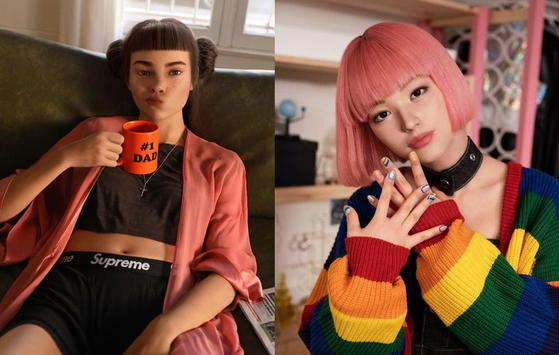Celebrities Replaced by AI | 매거진에 참여하세요
Celebrities Replaced by AI
#Entertainm #AI #Influencer #Virtual #Media #Future
The Rise of Virtual Stars in the Age of Algorithms- AI Is Coming for the Spotlight
In recent years, AI has moved beyond being a tool—it’s become a creator, a performer, even a persona.
In the world of entertainment and pop culture, that means one thing: the rise of AI celebrities.
From singing and dancing to hosting livestreams and starring in music videos, AI avatars are no longer just digital sidekicks.
They’re becoming the main act.
Projects like virtual YouTubers (VTubers), AI idols, and synthetic influencers have already gone mainstream.
Fans adore them. Brands hire them. Algorithms drive them.
So here’s the question:
Are human celebrities at risk of being replaced? Or are we entering an era of coexistence between flesh and code?
When Fiction Became Idol: The Case of “ISEGYE IDOL”
In 2022, a group of Korean streamers launched ISEGYE IDOL, a virtual idol project created by popular content creator Wakgood.
Though the voices behind the characters are real people, their public personas exist solely as 3D avatars in a fictional universe.
These characters released music, performed virtual concerts, and amassed a loyal fanbase. The kicker? They don’t exist.
And that didn’t matter.
Audiences were emotionally invested—not in the person, but in the character. The story. The world-building.
ISEGYE IDOL posed a fundamental question:
Do celebrities need to be real anymore?
If the narrative is compelling and the emotional resonance feels authentic, existence becomes a technicality.
Lil Miquela and the Rise of Virtual Influencers
Perhaps the most famous virtual influencer to date is Lil Miquela—a CG-created, AI-managed persona who emerged in 2016.
She’s not human, but:
- She stars in fashion ads
- Appears on magazine covers
- Posts on Instagram
- Gives interviews
- Has millions of followers

And she never ages, never gets embroiled in scandals, and never needs sleep.
Here’s why brands love her (and her AI peers):
- Timeless appearance — consistent look across years
- Zero controversy risk — no personal baggage, no unpredictability
- 24/7 availability — infinite content generation
- On-brand personality — fully programmable to match brand tone
To Gen Z and Gen Alpha, she’s not uncanny—they find her refreshingly digital-native.
DIY Fame: Anyone Can Make an AI Celebrity Now
Platforms like Character.AI, Fictional, Deep Agency, and AI Influencer Generator now let anyone create their own virtual influencer with just a few images and a backstory.
These AI personas don’t just post pictures. They:
- Auto-generate captions and replies
- Hold simulated Q&As
- Maintain brand-consistent personas across social media
In other words, celebrity has become scalable.
No auditions. No contracts. Just code and creativity.
100% AI Idol Groups Are Already Here
Let’s look at three examples that show just how far we’ve come:
1. MAVE:
Debuted: Jan 2023
Created by Netmarble’s Metaverse Entertainment
Members: SIU, ZENA, TYRA, MARTY — all AI-generated
Uses AI voice synthesis and emotion modeling
Engages fans with multilingual AI conversations
2. Eternity:
Launched by AI startup PULSE9
Members: 11 entirely virtual characters
Features deepfake vocals and synthetic faces
Real-time AI-driven fan interactions
3. K/DA:
Launched by Riot Games (2018)
Based on League of Legends characters
Vocals by real artists, but visuals and persona are fully virtual
Known for hit songs like “POP/STARS” and “More”
These groups don’t “simulate” being idols—they are idols. With fans, merchandise, lore, and global reach.
Why Early Virtual Celebs Failed—and What’s Different Now
This isn’t the first time we’ve seen digital celebrities. Japan’s Kyoko Date (1996) and Korea’s cyber singer Adam (2000) were early attempts.
But they didn’t last. Why?
- Lack of story: They were characters, not narratives.
- Limited platforms: No YouTube, TikTok, or social media meant no two-way interaction.
- Uncanny tech: Facial expressions, voice synthesis, and motion capture were crude by today’s standards.
Today, we have the opposite:
Tech that feels real. Platforms that foster community. Audiences ready for the unreal.
But Can AI Truly Replace Human Celebrities?
Let’s not forget what makes human stars beloved:
Authenticity
Growth
Vulnerability
Fans don't just consume content—they connect. They watch real people evolve, fail, and triumph.
There’s magic in imperfection.
In unscripted moments.
In the real becoming extraordinary.
AI may outperform in efficiency, consistency, and brand alignment—but it can’t replicate the emotional texture of human experience.
At least, not yet.
The Future: Human, AI, and Hybrid Coexistence
Rather than a binary replacement, the entertainment world is likely headed toward hybridization:
- AI handles scalable, brand-safe, algorithm-friendly content
- Humans bring raw emotion, spontaneity, and cultural nuance
New roles emerge where virtual and real personas blend
The core of celebrity is not flesh—it’s feeling.
Whoever tells the best story, evokes the deepest emotion, and inspires the widest audience—wins.
Whether that’s a person or a program?
Time will tell.






